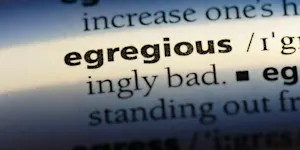What Makes This Word Tick
"Insinuate" is a delightfully sly word, often used when someone hints at something without saying it outright. It's a verb that suggests a method of communication done sideways, like a story shared with a wink and a nudge. It's a bit like gossip's charming cousin, with an air of mystery and intrigue.
If Insinuate Were a Person…
Insinuate would be the person at a party who glides through conversations, dropping little hints and half-truths that leave everyone guessing. They are never overt, preferring to let listeners fill in the blanks. Imagine someone who raises an eyebrow at just the right moment and always leaves you wondering if they know something you don't.
How This Word Has Changed Over Time
Historically, "insinuate" has stayed quite true to its roots. Initially, it had a far more physical connotation, meaning to introduce or bring in gradually. Over time, it has evolved to describe more abstract introductions, like ideas or suggestions, often with a hint of manipulation.
Old Sayings and Proverbs That Use Insinuate
While not featuring prominently in proverbs, the spirit of "insinuate" can be found in sayings like "read between the lines." This captures the essence of picking up on subtle hints and hidden meanings, much like what someone might do when faced with insinuations.
Surprising Facts About Insinuate
Did you know that in the world of communications, insinuations are an art form? Skilled communicators often use insinuations to plant ideas or feelings in their audience subtly. It's a strategic move in rhetoric and negotiations, valued for its ability to persuade without seeming direct.
Out and About With This Word
You might encounter "insinuate" in a heated debate or whispered conversation where one person is suggesting something unkind about another. It also finds its way into literature and film, revealing the true motives of ambiguous characters.
Pop Culture Moments Where Insinuate Was Used
In the realm of film noir, characters often insinuate darker intentions through their dialogue, with insinuations adding to the mysterious and suspenseful atmosphere. Think of the classic detective stories where nothing is ever plainly stated, and truths are teased out slowly.
The Word in Literature
In literature, "insinuate" is a tool for authors to create tension and drama. It’s particularly at home in mysteries and thrillers, where characters might insinuate knowledge of a hidden secret without spelling it out. Agatha Christie, with her penchant for complex plots, would likely have a soft spot for such a word.
Moments in History with Insinuate
During the Cold War, insinuations were commonplace as diplomats and spies navigated a world of half-truths and unstated threats. The word perfectly captured the essence of the subtle psychological maneuvers that defined this tense period in history.
This Word Around the World
In French, "insinuer" carries much the same connotations as its English counterpart. Across various languages and cultures, the concept of insinuating is universally understood, although the tactics and subtleties of its use can vary widely.
Where Does It Come From?
"Insinuate" originates from the Latin "insinuare," which means to wind one's way into or to creep in. This etymology perfectly captures the word's modern sense of introducing ideas stealthily or subtly into someone’s mind.
How People Misuse This Word
People sometimes misuse "insinuate" when they mean "state" or "imply" directly. While implying might be subtle, insinuations involve an even more delicate dance of suggestion, with the speaker never fully revealing their hand.
Words It’s Often Confused With
Imply: Both hint at something unspoken, but "imply" is more direct.
Intimate: While it can mean a close relationship, in another context, it suggests or implies subtly, similar to insinuate.
Suggest: Generally more straightforward, lacking the sneaky connotation of "insinuate."
Additional Synonyms and Antonyms
Synonyms include "hint," "suggest," and "imply." Antonyms would be "declare," "state," and "announce," all of which involve clear and direct communication.
Want to Try It Out in a Sentence?
"When Elizabeth mentioned a 'generous spirit' in relation to his donation, she was careful to insinuate rather than outright praise, leaving room for questions about his true motives."
















